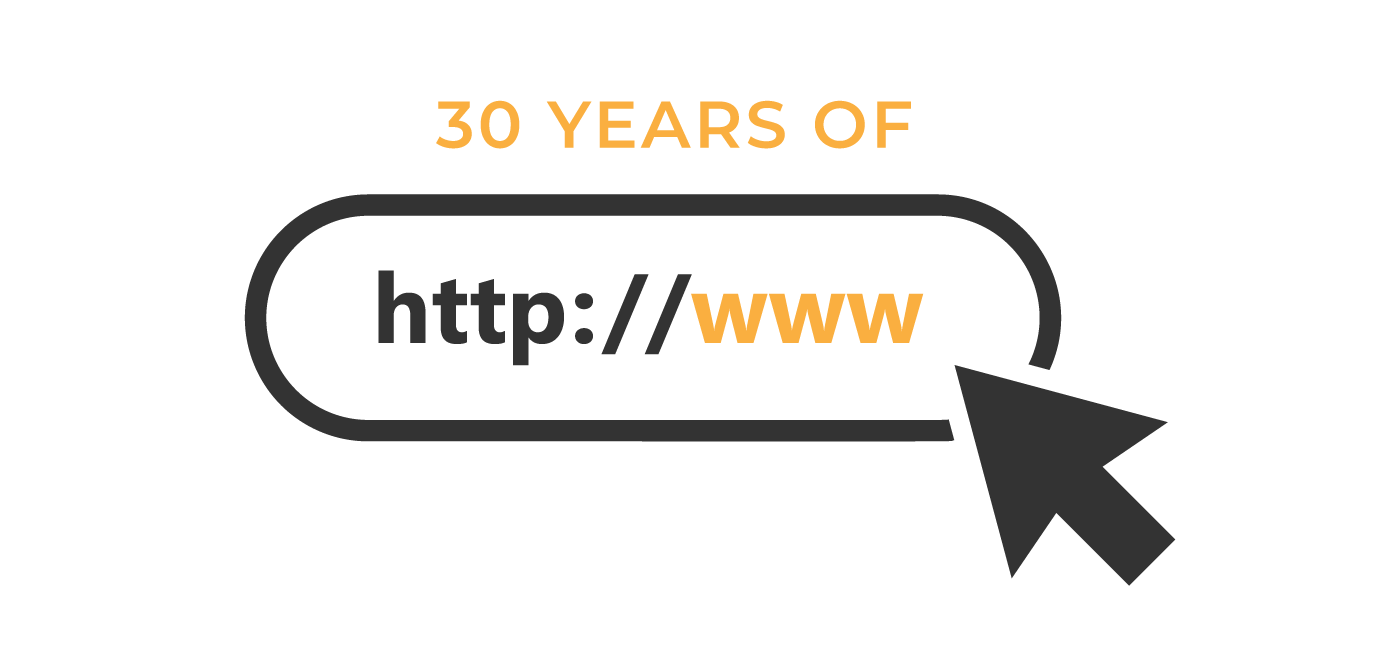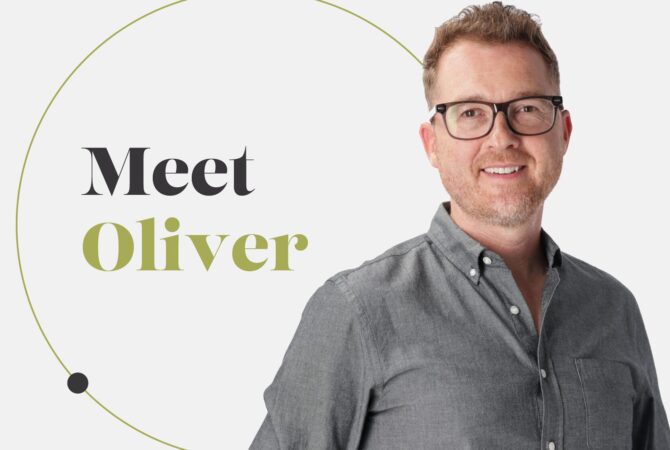30 years of the World Wide Web and the age of the website.

Happy 30th birthday to the World Wide Web (www).
English scientist Tim Berners-Lee invented the World Wide Web in 1989 while working for the Conseil Européen pour la Recherche Nucléaire (CERN) near Geneva, Switzerland. In my opinion, the invention of the web/website has been one of the most important and democratizing innovations in human history. Online access to information and education has become available to 55.1% of the global population. As a self taught entrepreneur, designer and web designer/developer, I can certainly attest to the power of this wonderful thing.
I thought this would be the perfect occasion to reflect on my experiences developing a career around web design and the “World Wide Web“, as well as share some insights on how to get your website right.
For something so darn important, the art of getting your website right certainly isn’t very clear. There seems to be a whole world of solutions and differing paths to take. And the one thing that truly makes it a difficult path to walk, everyone you talk to is invariably going to be an expert on the subject. Which may or may not leave you scratching your head wondering which “right way” is in-fact, the “right way”.
As the CEO of Ginger, the leading Digital Marketing Agency in the Fredericton region of New Brunswick, as well as the owner of The Hartt Shoe Co, a luxury e-commerce shoe brand, a good website is something I have to get right.
Chatrooms and Dial Up Internet
To give some background, let’s take things all the way back to 1995. Windows95 just came out and the age of dial up internet was in full swing. Phones were still attached to the wall and I had just taught myself to build my first website. Shortly after, I created a website for my junior high because…well, no else knew how to. For the next 24 years, I developed this passion for the digital realm into a career as a designer/web designer, freelancer and eventually into my current leadership role. I’ve seen a lot of changes in 24 years. Heck, I’ve even seen flaming skull GIFs come into style twice now.
From building my school’s website to overseeing a website build for a billion dollar infrastructure project, I’ve had to keep sharp. Although the challenge has evolved as I now focus my time on building teams that build awesome websites. Ensuring we have the right people with the right knowledge rests squarely on my shoulders. Because of this, it is as important as ever that I understand exactly how to create value online.
Now coming back to the reason why you are here, what does it take to make a great website? You may find yourself asking any number of questions, such as:
- What makes a good website?
- What makes a great website?
- What’s important from a technical perspective?
- What’s important from a design perspective?
- What is important from a marketing perspective?
- What’s important from an SEO perspective?
- What the hell is SEO?
- How much does a good website cost?
In order to offer as much clarity as possible, I’m going to outline all the things you should try to get right when tackling your next web project. Whether you are building an educational website for a non-profit, or a government agency, or building a website with the purpose of driving value for your business, knowing the answers to the following questions will help you formulate a plan.
Step 1: Set a goal
Before setting out on any journey, it is important to know where you are going. I highly recommend having an understanding of exactly you want to accomplish beyond “my business needs a website.” For this reason, it is important to work with an expert with strategic experience who can help you understand what are realistic and achievable outcomes, as well as the timeframe required to achieve them.
Step 2: Understanding your overall strategy, and how your website fits into it.
How does your website create value for your business/organization? Does it drive sales online? Will it create public education and awareness? Does it educate customers before they walk through your door? Does it help your customers understand your competitive edge?
Step 3: Where do you plan on getting traffic?
Every website needs visitors before it can create value. Where are these visitors going to come from? Will you be running advertising online or offline? Are you going be emailing potential customers? Will you be relying on search engines to deliver visitors to your site?
Step 4: Once you have traffic, what does success look like?
Now that you have a website with lots of visitors, how are you making sure you are succeeding? It’s important to know exactly how your website will create value for your website, as well as how to measure and improve it.
Make sure you discuss this plan with your website expert. One of the advantages of working with a marketing agency to build a website is the experience of the team working on the project. Projects will have oversight from a strategic point of view, as well as a a broader team working to bring your vision to life. In the case of Ginger, this includes my experience working on thousands of projects over the last 24 years, a seasoned brand strategist and account manager, an art director, creative director and an amazing web developer.
What makes good website?
A good website delivers value. It is clear, consistent and technically sound.
What makes a great website?
The major difference between a good website and a great website is whether of not it was designed to take full advantage of the opportunities available online. Was it created simply because you need a website? Or was it created with a plan and a purpose by those who know exactly what to do? Does the website tell your brand story effectively? Is there a well strategized content strategy? Does it understand the value it brings an organization with a way to measure it?
What’s important from a technical perspective?
While this is a broad topic with many implications, the most important things are speed, on-site SEO and standards compliance. Search engines should bring your most important traffic. If you get this right, search engines will reward you with better results and new customers.
What’s important from a design perspective?
Your website needs to be intuitive, clear and simple. It needs to understand what objective you are trying to achieve and be designed to fulfill that purpose. Simplicity is important, but also difficult to get right. Simplicity is the ultimate form of sophistication.
What’s important from a marketing perspective?
If your website is well built, it should bring you customers. People should find you while searching for solutions to their problems. Beyond this, it should be planned to accommodate the way you advertise, educate customers and have a clear understanding of your customer journey.
What’s important from an SEO perspective?
SEO is incredibly important to your website. In my opinion, it is the most important element of your site, as this has the potential to deliver the highest ROI in marketing, if done properly.
What the hell is SEO?
SEO is Search Engine Optimization. It is a big complicated mess that Google and other search engines use to decide how they are going to rank your website in their search results. It can be the difference between lots of business and the sound of crickets chirping.
How much do good websites cost?
Well this is an interesting question, indeed. I often hear sales people likening this question to, “How long is a piece of string?”. Pricing is complicated, and it is usually a factor that you can use to gauge expertise and experience. However, that does not necessarily mean that a higher price will result in better results, nor does it mean that a lower price will result in a lesser results, provided that you know what you are looking for. If you know the right questions to ask and what to look for, making that decision should be easy. Who can deliver the best proven value. You simply need to know how to evaluate that value. However, always ask for concrete proof. Remember, in a world where everyone is an expert, make sure your expert has a track record of understanding and proving ROI (return on investment) with cold hard data.
Conclusion
In conclusion, there is a lot of know about the web. It’s complicated and often a moving target. Sometimes it may feel like a perpetual wild west, but I promise there are many qualified experts out there who know what they are doing. I hope this post helps you sort through some of the questions you should be asking, as well as some of the expectations of your website. Thanks for taking the time to read. If you have any feedback or questions, feel free to reach out and ask. We are always here to help!



